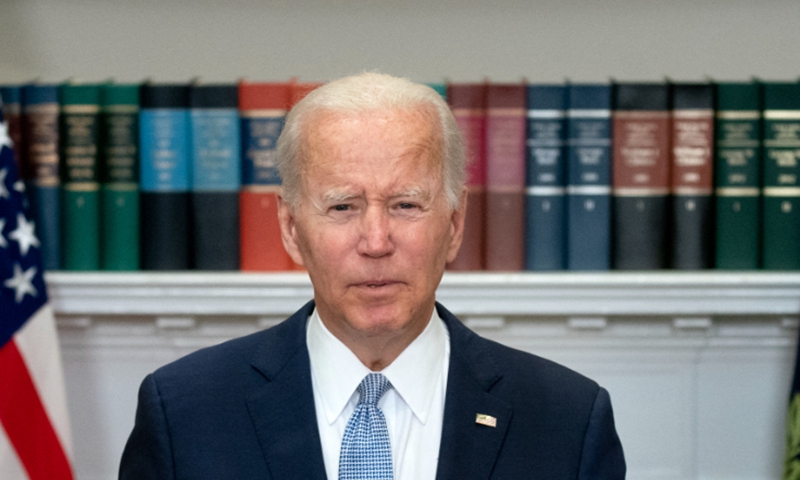
US President Joe Biden. File Photo:AFP
In his farewell speech at UN stage before leaving the Oval Office of White House, US President Joe Biden recalled his early political career as a US senator elected in 1972, summarized his "achievements" over the past four years as president before quickly shifting focus to China.
Biden reiterated competition with China while implicitly boasting about certain areas of cooperation. China is such an important topic that the US president could not deliver his speech at the UN without it, Chinese observers said on Wednesday, urging the US to reflect on its domestic and international policy agenda as it is the US that has been fueling and instigating many of the global conflicts.
Biden claimed the US seeks to responsibly manage the competition with China and stands ready to cooperate, when he addressed the General Debate of the 79th session of the United Nations General Assembly (UNGA) on Tuesday.
"We recently resumed cooperation with China to stop the flow of deadly synthetic narcotics. I appreciate the collaboration," Biden said, according to a press release on White House website.
Biden also said the US is unabashed, pushing back against "unfair economic competition and against military coercion of other nations" in the South China Sea, in maintaining peace and stability across the Taiwan Straits, in protecting the US' most advanced technologies so they cannot be used against the US or its partners.
Li Haidong, a professor at the China Foreign Affairs University, told the Global Times on Wednesday that without saying the word "threat," Biden's remarks seem to send a message that "China is a threat to the US."
Lü Xiang, an expert on US studies at the Chinese Academy of Social Sciences, saw Biden's mentioning of the South China Sea also as "offering comfort to the Philippines" as the US shows little credibility in its actions before its allies.
Analysts pointed out that Biden's speech hijacked the UN platform to push its strategic competition agenda, which is irresponsible and harmful when the General Debate is supposed to be a most inclusive, representative and authoritative platform for global reflection and collective action to address global challenges.
World leaders gathered in New York for the UNGA amid growing calls for more international cooperation to address challenges such as climate change, poverty and inequality, while tackling the fallout from ongoing conflicts and global health crises, Xinhua News Agency reported Tuesday.
Wang Yi, member of the Political Bureau of the Communist Party of China Central Committee and Chinese foreign minister, is having a whirlwind of bilateral meetings with representatives of other countries and will address the UNGA on Saturday.
On the Palestinian-Israeli conflict, the UNGA on September 18 passed a non-binding resolution by an overwhelming margin, demanding an end to Israel's occupation of Palestinian territory within the next 12 months.
South African President Cyril Ramaphosa called for a collective effort through the UN system and other multinational institutions to end civilian suffering and for South Africa's legal action taken against Israel through the International Court of Justice (ICJ) to prevail, according to Xinhua.
In regard to the Russia-Ukraine conflict, Brazilian President Luiz Inácio Lula da Silva said the use of increasingly destructive weapons brings to mind the darkest times of the sterile confrontation of the Cold War. Creating conditions to resume direct dialogue between the parties is crucial at this time, a message of the six-point understanding that China and Brazil are jointly promoting.
Wang said at a ministerial-level Security Council meeting on Ukraine crisis that the more weapons are sent to the battlefield, the more difficult it is to achieve the goal of cease-fire, while noting that "China has all along stood on the side of peace."
But the US' attitude on the two most prevailing and devastating conflicts was frustrating, analysts said. Biden, although showing some concern over the crisis in Gaza in his speech, backed Israel's need for "security" without the mentioning of latest explosions in Lebanon that were widely believed to be Israel's action.
Biden also underlined US-led aid to Ukraine, security and humanitarian assistance, and boasted about a bigger, stronger, and more united NATO.
Lü said the US is just making a mediation gesture on the Mideast issue when it indulges Israel's behavior.
As for Ukraine, the US keeps fanning flames so that its military-industrial complex can make a big fortune from the prolongation of the war, Lü noted.
When the US is bringing about crisis, division, confrontation and conflicts, its claims of seeking peace are nothing but a farce, Lü noted.
Li noted that Biden’s remarks on US role in international affairs and hot spot issues seek “to cover up the fact that the US is a warmonger,” but the international community has crystal clear understanding of the US’ true face.
The US seeks to retain its past “glory” and global dominance, but its actions are only creating more crises, analysts said.




